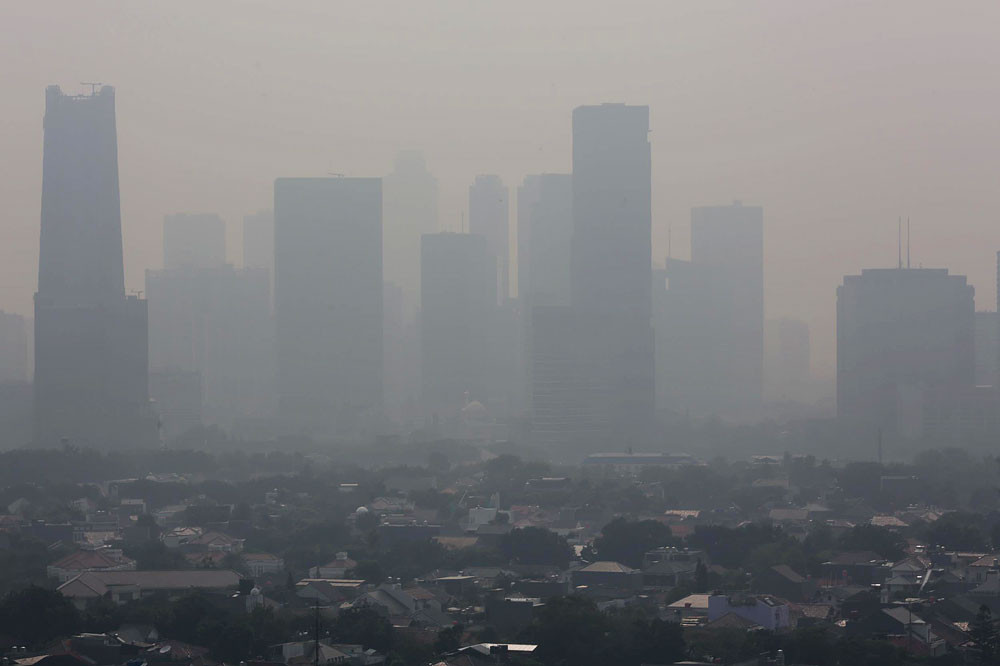Popular Reads
Top Results
Can't find what you're looking for?
View all search resultsPopular Reads
Top Results
Can't find what you're looking for?
View all search resultsJakarta's enemy is air pollution
Jakarta people must stop the political frictions. They’d better devote their energy to efforts to make the government take concrete and bold measures to fight air pollution. We should no longer expose ourselves and our children to the hazardous impacts of air pollution
Change text size
Gift Premium Articles
to Anyone
A
fter the festive celebration of Jakarta’s 492nd anniversary and the settlement of the presidential election result dispute at the Constitutional Court, the capital should shift its focus back to its real problems.
People inhabiting the city face a clear and present enemy called air pollution. A Greenpeace report released in early 2019 listed Jakarta as Southeast Asia’s most polluted city.
Throughout 2018, Jakarta’s PM2.5 reached 45.3 micrograms per cubic meter or more than four times the maximum standard set by the World Health Organization (WHO) and three times the maximum level allowed by the Indonesian national standard.
PM2.5 is one of the most dangerous pollutants with the worst health impacts among commonly measured air pollutants. Its small size, up to 2.5 microns, enables it to penetrate deep into the human respiratory system and the entire body. Its common sources include combustion from vehicle engines, industry, wood and coal burning, as well as through other pollutants reacting in the atmosphere.
The surging levels of PM2.5 will raise the risk of respiratory illnesses, heart attacks, cancers and strokes, naturally increasing sick leave, hospital admissions and health subsidies. Thus the 2019 World Environment Day celebrated on June 5 was fittingly themed “Beat air pollution”.
For years, the central and Jakarta governments have taken inadequate measures to combat air pollution affecting the city. The current national ambient air quality standard, released in 1999, is outdated and far less rigid than the WHO’s standard. The maximum standard of daily PM2.5 levels set by the government is 65 micrograms/m³ compared with the WHO’s standard of 25 micrograms/m³.
Worse, the required devices to monitor air pollution is lacking. The Environment and Forestry Ministry only operates one air quality monitoring station in Jakarta, located inside the Gelora Bung Karno Sports Complex.
Meanwhile, the Jakarta Environment Agency operates five monitoring stations and none of them provide real time data. On June 3, for instance, the agency’s website reported the city’s air quality of May 20, a time lag of around two weeks.
We often must rely on two monitoring stations in South Jakarta and Central Jakarta, which belong to the United States Embassy. According to the South Jakarta station, throughout 2018 only 11 days in Jakarta had “good” air quality. The rest were moderate (86 days), unhealthy for sensitive groups (130 days) and unhealthy (98 days). The annual PM2.5 level in South Jakarta based on the monitoring was 45.9 micrograms/m3, slightly worse than the level reported by Greenpeace.
Beyond those figures, we already know and feel that it is hard to breathe clean air in Jakarta. Parents are also aware that Jakarta’s air is not safe for their children.
Much worse situations are experienced by sensitive groups such as pregnant women, children under 5 years old and people with long-term health problems.
Despite the massive and hazardous impacts of air pollution, the government appears to be negligent for several reasons. First, public pressure remains very limited. Jakartans tend to focus on politics and fragmentation instead of pressing issues that are related to their own health. Second, air pollution is much less visible compared to issues of flooding, water pollution and waste.
Jakarta Governor Anies Baswedan has acknowledged the city’s severe air pollution. Yet beyond rhetoric the municipality must take swift and concrete measures to address air pollution.
First and foremost, the city needs to provide enough air quality monitoring equipment.
The devices should not only be in place in Jakarta but also in its neighboring provinces of West Java and Banten since air pollution knows no borders. Jakarta should have no problem in buying the equipment.
Jakarta also needs to conduct regular research on emissions to be able to update the level of emissions from transportation, coal-fired power plants, industrial activities and households. By doing so, the government can take accurate measures to address air pollution.
Finally, Jakartans deserve a much better air quality standard. The current national standard is too outdated and lags behind that of other countries.
Jakarta people must stop the political frictions. They’d better devote their energy to efforts to make the government take concrete and bold measures to fight air pollution. We should no longer expose ourselves and our children to the hazardous impacts of air pollution.
Jakartans deserve clean and healthy air and blue skies every day.
***
The writers are climate and energy campaigners at Greenpeace Southeast Asia, Indonesia.










